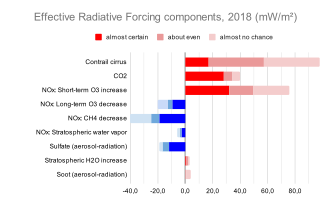Environmental effects of aviation
Environmental Effects of Aviation
The Environmental effects of aviation are significant as air travel is a major source of carbon dioxide emissions and other greenhouse gases. The aviation industry contributes to the global environmental impact in various ways, including emissions, noise pollution, and the consumption of non-renewable resources. This article explores the environmental footprint of aviation, its implications, and the efforts to mitigate its impact.
Overview
Aviation is a critical component of the global transportation system, providing rapid connectivity across continents. However, the environmental impact of aviation is a growing concern. Aircraft engines emit carbon dioxide (CO2), nitrogen oxides (NOx), sulfur oxides (SOx), water vapor, and particulate matter, contributing to climate change and local air quality issues. Additionally, the high altitude at which airplanes operate allows their emissions to have a more potent effect on the atmosphere compared to ground-level sources.
Emissions
The primary environmental concern related to aviation is its carbon footprint. Aviation is responsible for around 2-3% of global CO2 emissions. However, when considering non-CO2 effects such as the impact of NOx on ozone formation and the formation of contrails and cirrus clouds, the overall contribution of aviation to global warming is estimated to be higher.
Carbon Dioxide
CO2 emissions from aviation result from the combustion of fossil fuels, primarily jet fuel. These emissions are directly proportional to the amount of fuel burned, which is influenced by factors such as aircraft efficiency, flight distance, and load factor.
Non-CO2 Emissions
Non-CO2 emissions from aviation, including NOx, SOx, and water vapor, also contribute to environmental degradation. NOx emissions, for example, can lead to the formation of ozone in the upper atmosphere, which is a potent greenhouse gas. Water vapor emissions at high altitudes can lead to the formation of contrails and cirrus clouds, which have a net warming effect on the Earth's climate.
Noise Pollution
Noise pollution from aircraft operations affects communities living near airports, leading to health issues such as stress, sleep disturbance, and cardiovascular problems. Efforts to manage noise pollution include the development of quieter aircraft, operational procedures to minimize noise, and land-use planning around airports.
Resource Consumption
Aviation relies heavily on non-renewable resources, particularly petroleum-based fuels. The industry's dependence on fossil fuels raises concerns about sustainability and energy security. Research into alternative fuels, such as biofuels and synthetic fuels, is ongoing to reduce the sector's carbon footprint and reliance on non-renewable resources.
Mitigation Efforts
Efforts to mitigate the environmental impact of aviation include technological advancements, operational improvements, and policy measures. Technological advancements aim at developing more fuel-efficient aircraft and engines, as well as exploring sustainable aviation fuels. Operational improvements focus on optimizing flight paths and improving air traffic management to reduce fuel consumption. Policy measures include emissions trading schemes, carbon offsetting, and regulations to limit the growth of aviation emissions.
Conclusion
The environmental effects of aviation are a complex issue that requires a multifaceted approach to address. While aviation provides essential connectivity and economic benefits, its environmental footprint cannot be ignored. Ongoing efforts to reduce emissions, manage noise pollution, and decrease reliance on non-renewable resources are critical to ensuring the sustainability of the aviation industry.
This article is a environment-related stub. You can help WikiMD by expanding it!
Transform your life with W8MD's budget GLP-1 injections from $125.
W8MD offers a medical weight loss program to lose weight in Philadelphia. Our physician-supervised medical weight loss provides:
- Most insurances accepted or discounted self-pay rates. We will obtain insurance prior authorizations if needed.
- Generic GLP1 weight loss injections from $125 for the starting dose.
- Also offer prescription weight loss medications including Phentermine, Qsymia, Diethylpropion, Contrave etc.
NYC weight loss doctor appointments
Start your NYC weight loss journey today at our NYC medical weight loss and Philadelphia medical weight loss clinics.
- Call 718-946-5500 to lose weight in NYC or for medical weight loss in Philadelphia 215-676-2334.
- Tags:NYC medical weight loss, Philadelphia lose weight Zepbound NYC, Budget GLP1 weight loss injections, Wegovy Philadelphia, Wegovy NYC, Philadelphia medical weight loss, Brookly weight loss and Wegovy NYC
|
WikiMD's Wellness Encyclopedia |
| Let Food Be Thy Medicine Medicine Thy Food - Hippocrates |
Medical Disclaimer: WikiMD is not a substitute for professional medical advice. The information on WikiMD is provided as an information resource only, may be incorrect, outdated or misleading, and is not to be used or relied on for any diagnostic or treatment purposes. Please consult your health care provider before making any healthcare decisions or for guidance about a specific medical condition. WikiMD expressly disclaims responsibility, and shall have no liability, for any damages, loss, injury, or liability whatsoever suffered as a result of your reliance on the information contained in this site. By visiting this site you agree to the foregoing terms and conditions, which may from time to time be changed or supplemented by WikiMD. If you do not agree to the foregoing terms and conditions, you should not enter or use this site. See full disclaimer.
Credits:Most images are courtesy of Wikimedia commons, and templates, categories Wikipedia, licensed under CC BY SA or similar.
Contributors: Prab R. Tumpati, MD




